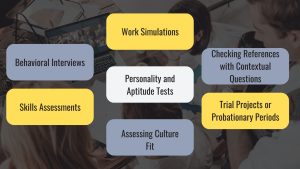content
Team Augmentation
January 6, 2025
6 min read
Introduction
Hiring the right candidate is one of the most important tasks for any organisation. Traditionally, resumes have been the cornerstone of this process. However, resumes often tell only part of the story. They provide a snapshot of skills, education, and experience but rarely reveal deeper qualities like problem-solving abilities, cultural fit, or adaptability. As a result, many companies are shifting their focus to alternative methods for assessing candidate fit. These methods aim to uncover a more holistic view of a candidate’s potential.
Why Resumes Aren’t Enough in Candidate Fit
Resumes primarily focus on past accomplishments. They list degrees, certifications, and positions that may be useful. But they don’t show how a candidate performs under pressure or collaborates on a team. What’s more, resumes can inadvertently favor candidates with polished writing skills or privileged access to prestigious opportunities. This makes it necessary to consider other ways to evaluate talent.

Alternative Methods to Assess Candidate Fit
To make more informed hiring decisions, companies are exploring different methods for assessing candidates. Here are some of the most effective strategies.
1. Behavioral Interviews
Behavioral interviews focus on how candidates have handled situations in the past. Instead of asking hypothetical questions, interviewers ask for specific examples. For example, “Can you describe a time when you resolved a conflict at work?” This approach helps employers assess real-world problem-solving skills and decision-making abilities.
Moving to behavioral interviews also allows companies to assess interpersonal skills. It shows how candidates think on their feet and approach problem-solving. These insights are often missing from a traditional resume.
2. Skills Assessments
Skills assessments are practical tools to measure a candidate’s abilities. They can include coding challenges, writing samples, or problem-solving exercises. For creative roles, a portfolio review is another great way to assess knowledge.
Skills assessments are especially valuable because they highlight what a candidate can do, not just what they claim to do on paper. By focusing on demonstrated abilities, companies can reduce bias and increase the likelihood of hiring the right person.
3. Work Simulations
Work simulations immerse candidates in tasks they might encounter in the role. For example, sales candidates might role-play a customer meeting. Meanwhile, developers might debug a piece of code.
These simulations provide insight into how candidates approach real-life scenarios. They also test technical skills and soft skills like communication and teamwork. What’s more, they give candidates a better understanding of what the job entails.
4. Personality and Aptitude Tests
Personality and aptitude tests can identify traits that align with a company’s values. For example, candidates for management positions might take tests that measure emotional intelligence or decision-making. Similarly, aptitude tests might assess logical reasoning, numerical skills, or creativity.
While these tests are not definitive, they can complement other assessment methods. They provide additional data points that help employers make informed decisions.
5. Assessing Culture Fit
Culture fit plays a major role in long-term employee satisfaction and performance. Companies often use structured interviews, surveys, or even informal meetings to assess alignment with their values. Questions like, “What kind of work environment do you thrive in?” can reveal valuable information.
However, it’s critical to balance culture fit with diversity. Hiring only those who are a perfect fit can lead to homogeneity. Instead, aim for a mix of people who share core values while bringing a variety of perspectives.
6. Checking References with Contextual Questions
References can provide a wealth of information if approached thoughtfully. Instead of asking general questions, focus on specifics. For example, “Can you tell me about a time when this candidate demonstrated leadership under pressure?” This type of question reveals actionable insights into the candidate’s behaviors and skills.
7. Trial Projects or Probationary Periods
For some roles, a short probationary period can be a great way to assess candidate fit. Candidates work on a real project or join a team temporarily. During this time, both the employer and the candidate can assess the fit. This method ensures mutual satisfaction before making a long-term commitment.

Implementing a Balanced Approach in Candidate Fit
No single method can fully assess a candidate’s potential. The most effective hiring strategies combine multiple approaches, especially in the case of team augmentation. For example, a company might use a combination of skills tests, behavioral interviews, and culture fit assessments. Together, these methods provide a 360-degree view of the candidate. It’s also important to be transparent throughout the process. Let candidates know what to expect and why each step is important. A transparent process not only builds trust, it also improves the candidate experience.

Benefits of Moving Beyond Resumes in Candidate Fit
Using alternative methods for candidate fit has several benefits. It reduces reliance on subjective judgment and minimises unconscious bias. It also allows companies to uncover hidden gems – candidates who may not shine on a resume but excel in real-world scenarios.
By investing in a more comprehensive assessment process, organisations can also improve employee retention. When candidates are a better fit for the role and the company culture, they are more likely to remain engaged and perform well.
Conclusion
The hiring landscape is changing. While resumes will likely remain part of the process, they should no longer be the only factor determining a candidate’s potential. By adopting alternative assessment methods, especially when augmenting teams, companies can make smarter and fairer hiring decisions. These approaches not only help find the right talent, but also help build stronger, more diverse teams.
If you have any questions or an idea for a project, contact us via sales@instandart.com or fill out the form on the main page of the site to discuss. We are always ready to help!
